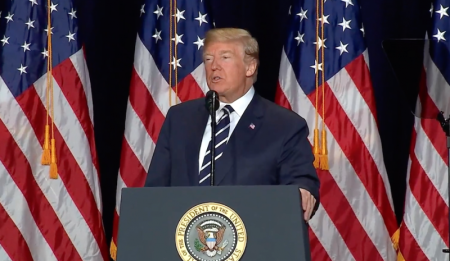The Immigration Debate Is a Moral Crisis

With a vote to fund the government for two more years, Congress by-passed the debate on immigration this week that Senate Majority Leader Mitch McConnell promised in exchange for an end to the government shutdown last month. In the interest of regular order, many Democrats were willing, once again, to trust that their Republican colleagues will work out a deal to protect DACA recipients before the March 7 deadline that the White House created last year.
Though many in Washington breathed a sigh of relief that they don't have to work through another long weekend, dodging the economic crisis of a shutdown exposes the moral crisis in Congress: we do not have political leadership willing to resist the policy violence of the Trump administration. And we need moral leadership to change that.
Republicans and Democrats must be honest about the extremism of the White House's immigration proposals. The President has publicly committed himself to ending family reunification, ending the diversity lottery, and instituting a "merit-based" system that is designed to exclude "undesirable" immigrants as US policy did before the reforms of 1965's Immigration and Nationality Act. These concrete proposals are, in fact, the policy agenda of the white nationalists who marched in Charlottesville last summer. We have not seen this level of institutional racism in our federal government since Woodrow Wilson re-segregated federal offices and played "Birth of A Nation" in the White House, celebrating the Klu Klux Klan. It is no accident that such blatant white supremacy a century ago was followed by the Literacy Act of 1917 and the Johnson-Reed Act of 1924, both of which aimed to reduce immigration from non-white countries.
At the beginning of Trump's administration, when his Muslim Ban was first announced, Americans flooded airports in spontaneous protest, insisting that we would not become a nation that makes bigotry its policy. Meanwhile, extreme voices within the White House and Congressional leadership have implemented policies and drafted legislation that target people who've lived for decades in the shadows of our broken immigration system. Rather than challenge this attack on neighbors created in God's image, many white evangelicals have celebrated Trump's commitment to "religious freedom."
Indeed, the most ardent supporters of today's anti-immigrant agenda are Christian nationalists. In God's name, they advocate and celebrate policies that demonize God's people. This is a moral crisis rooted in American Christianity's capitulation to the racial logic of the plantation economy. Slaveholder religion is not new, but it is spiritually lethal. In concert with political power, it threatens the very soul of America.
I have witnessed this moral crisis firsthand as a minister in a church offering public sanctuary. Shortly after Trump's inauguration last year, Jose Chicas, a pastor in Raleigh, North Carolina, went to his annual check-in with Immigration and Customs Enforcement (ICE). Chicas has lived in the US since 1986, when he fled his native El Salvador during the US-sponsored repression of his people. Under both Democrat and Republican administrations, Chicas has been granted permission to continue living and working in the US. But at his first check-in with ICE under the Trump administration, he was told that he had three months to leave the only home his family of six has ever known.
When we learned Chicas' story, St. Johns Missionary Baptist Church and the School for Conversion offered him public sanctuary on our property in Durham, North Carolina. Rather than turn himself into ICE and leave his family without any hope of returning, Chicas chose to enter a religious institution and, like the apostle Paul before him, make the moral case against this administration's agenda from within confinement.
Rev. Chicas has been a prophetic witness to our community and to the nation over the past seven months. As a pastor devoted to his flock, he gets up every morning at 5am to lead prayers for his congregation via FacebookLive. They have had a lot to pray about. Mostly immigrants from Central America, his flock received the news of Trump's decisions to end Deferred Action for Childhood Arrivals (DACA) and Temporary Protective Status (TPS) last year as direct assaults on their communities. Their pastor knows their pain. His oldest son, who has been supporting the family while Chicas is in sanctuary, has DACA. His mother, Chicas' wife, has TPS.
"Mr. Trump said he supports the evangelicals," Rev. Chicas' wife, Sandra, said. "I do not understand. My husband is an evangelical. I am an evangelical." The Chicas family understands that tragic stories about children murdered by MS-13 gang members, like those Trump told in his State of the Union Address, are being used to paint people like them as enemies of the state.
The Chicas family is not a threat to America; they are, instead, witnesses to the hope that America is still possible. Any "merit-based" system of immigration that pits Dreamers like the Chicas' eldest son against his parents and community is a 21st-century manifestation of the white supremacist immigration policies that diminished this nation until they were overturned during the Civil Rights movement in 1965. We as a nation cannot celebrate the end of Jim Crow and, at the same time, reinstitute the immigration policies of white supremacy. Democrats in Congress must head the cries of Dreamers who are sitting-in at their offices to say they are not willing to sell out their communities for a pathway to citizenship.
These are difficult days for America, and we must all be ready to name the fundamental moral values we will not compromise. For courage and direction, we can look to witnesses like Rev. Chicas and his family, who make clear that another America is possible. We can follow fellow Americans like them to the freedom of a more perfect union.
Jonathan Wilson-Hartgrove directs the School for Conversion in Durham, North Carolina. His new book, Reconstructing the Gospel: Finding Freedom From Slaveholder Religion, will be published March 13.




















